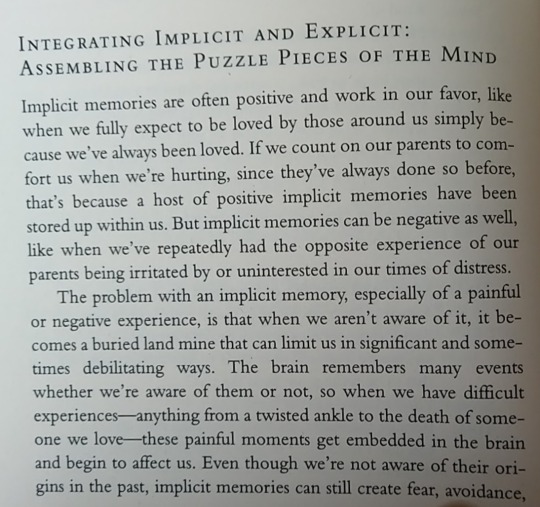#tina bryson
Text

The Whole-Brain Child, Daniel Siegel and Tina Bryson
#OH WAIT THIS EXPLAINS MY STRUGGLES THO#being married to my husband has been super healing in breaking me free from a lot of it#this is a parenting book but it still speaks to my own mental struggles lmao#the whole brain child#daniel siegel#tina bryson#neuroscience#parenting
20 notes
·
View notes
Text
Height posting!!
Campers
Jody- 4'11
Seth- 5'1
Noelle- 5'2
Elizabeth- 5'2
Danika- 5'4
Trin- 5'5
Taylor- 5'5
Sam- 5'6
Evan- 5'7
Justine- 5'7
Glenn- 5'8
Harriet- 5'8
Issac- 5'9
Leshawn- 5'9
Ginnifer- 5'9
Alejandra- 5'9
Corey- 5'10
Opal- 5'10
DJ- 5'10
Bryson- 5'10
Lincoln- 5'11
Kam- 5'11
Heath- 6'1
Simon- 6'5
Hosts
Chris(tina)- 5’8
Blaine- 5’11
Chef (Machete)- 6’2
43 notes
·
View notes
Text






I first read about the noodle technique in "The Whole-Brain Child" by Daniel Siegel and Tina Payne Bryson. It's been working really well for me! Let me know your experience if you try it!
131 notes
·
View notes
Text
These books are written "geared towards" adults and older teens. I personally would let my teen read all of these, so I'm not gatekeeping literature, but use your own judgement on what you think is acceptable for your own kid to read.
Nonfictional Books for adults:
All the weight of our dreams by Lydia XZ Brown
Stim: an autistic anthology edited by Lizzie Huxley-Jones
Connecting with Autism by Casey Corner
Sincerely your Autistic child by AWNN
Uniquely human by Barry m prizant
Engaging autism by Stanley Greenspan
Raising human beings by Ross Greene
Beyond behaviours by Mona delahooke
The whole brain child by Dan Siegel & Tina Payne Bryson
Autism and gender by Jordynn Jack
It's your weirdness that makes you wonderful Kate Allan
Women and girls with autism spectrum disorder Sarah Hendrick
Worlds of Autism by Joyce davidson
Authoring autism by melanie yergeau
Nerdy Shy and Socially Inappropriate Cynthia Kim
Autistic disturbances by julie rodas
War on Autism by Annie McGuire
Rethinking autism diagnosis by kathenne Cole, Rebecca mallet, and sammy
Leaders all around me by Edlyn Vallejo Peña, PhD
Ido in autismland by Ido Kedar
Typed words loud voices by Amy Sequenzia & Elizabeth J. Grace
It's an autism thing by Emma Dalmayne
What Every Autistic Girl Wishes Her Parents Knew by Autism Women’s Network
Women on the Spectrum: A Handbook for Life by Emma Goodall and Yenn Purkis
Unmasking autism by Devon Price
Neurotribes by Steve Silberman
Love, Partnership or Singleton on the Autism Spectrum & Bittersweet on the Autism Spectrum, both edited by Luke Beardon and Dean Worton
Autism, Anxiety and Me: A Diary in Even Numbers by Emma Louise Bridge & Penelope Bridge
Autism: A New Introduction to Psychological Theory and Current Debate by Sue Fletcher-Watson and Francesca Happé
A Practical Guide to Happiness in Adults on the Autism Spectrum: A Positive Psychology Approach by Victoria Honeybourne
Gender Identity, Sexuality and Autism by Eva A. Mendes and Meredith R. Maroney
The Guide to Good Mental Health on the Autism Spectrum by Jeanette Purkis, Dr. Emma Goodall and Dr. Jane Nugent
Different, Not Less: A Neurodivergent's Guide to Embracing Your True Self and Finding Your Happily Ever After by Chloe Hayden
Memoirs:
Odd Girl Out by Laura James
Uncomfortable Labels by Laura Kate Dale
Drama Queen by Sara Gibbs
The Electricity of Every Living Thing by Katherine May
Fall down Seven Times Get Up Eight by Naoki Higashida
The Reason I Jump by Naomi Hashida
The Electricity of Every Living Thing by Katherine May
Wintering by Katherine May
Diary of a Young Naturalist by Dara McAnulty
Explaining Humans by Dr. Camilla Pang
Fingers in the Sparkle Jar by Chris Packham
Adult Fiction:
Adult Virgins Anonymous by Amber Crewe
Exciting Times by Naoise Dolan
A Girl Like Her by Talia Hibbert
Get a Life, Chloe Brown by Talia Hibbert
Act Your Age, Eve Brown by Talia Hibbert
Convenience Store Woman by Sayaka Murata
Failure to Communicate by Kaia Sønderby
An Unkindness of Ghosts by Rivers Solomon
#audhd#asd#autism acceptence month#autism#actually audhd#autistic adult#autistic pride#autistic#actually autistic#autism acceptance
19 notes
·
View notes
Text
its a pink princess world
⋅˚₊‧ ଳ ‧₊˚ about moi ! ⊹
tini, tiny, tina, tintin or mel. she/they. 18. bio med student. unapologetically black. pop culture enthusiast. still waiting for my hogwarts acceptance letter. secretly a vampire that is also a mermaid. unhealthy obsession with the colour pink. raging lesbian
⋅˚₊‧ ଳ ‧₊˚ interests ! ⊹
°‧🫧⋆ music.ೃ࿔*:・
➵ music enthusiast (add me on airbuds! @/pnkprincess)
SZA . Brent Faiyaz . Kali Uchis . Azealia Banks . JT . City Girls . Kehlani . Bad Bunny . Blood Orange . Karol G . Young Miko . Rina Sawayama . Clairo . Ethel Cain . Lil Uzi Vert . Bossman Dlow . Megan Thee Stallion . PND . Bryson Tiller …
°‧🫧⋆ obsessions .ೃ࿔*:・
trashy reality tv (aka mtv n tlc) . wbb . twilight . H2O just add water . Barbie movies. Game of Thrones . Mean Girls . White Chickz . women’s football . BPWF . Pinterest . Bridgerton . Challengers . women’s rugby
⋅˚₊‧ ଳ ‧₊˚ blog ! ⊹
just a teenage girl navigating through life. this blog is my diary. i like to disappear often so don’t expect to see me post consistently but i’m always lurking ;). asks are always open pls talk to me♡ ~('▽^人) [caution: i don’t bite but i do enjoy to nibble on arms :) ]
⋅˚₊‧ ଳ ‧₊˚ navigation ! ⊹
pnkprinc3ss
8 notes
·
View notes
Text
character pride icons pt. 40: misc. tv/movies (again again!) pt. 1
canon queer characters



adam eduardo alvaro (jane the virgin) + petra solano (jtv) - bisexual | luisa alver (jtv) - lesbian



tina tevetino (dirk gently's) + kitty song-covey (xo kitty) - bisexual | yuri han (xo kitty) - lesbian


florian + q (xo kitty) - gay


juliana (xo kitty) - lesbian | denise bryson (twin peaks) - transgender
feel free to use these for any non-commercial purpose, as long as proper credit is given!
if you'd like to see a different combination of character + flag, my ask box is always open for requests
#queer characters#queer headcanons#character icons#pride icons#pride flags#icons#jane the virgin#xo kitty#twin peaks#adam eduardo alvaro#petra solano#luisa alver#kitty song covey#yuri han#denise bryson#bisexual#transgender#lesbian#gay
20 notes
·
View notes
Text
Bahagia dalam Taat
“Bunda, aku nggak suka memuliakan tamulah. Aku nggak mau belbagi”
Mendapati Rafika berkata seperti itu, jujur saya hanya diam. Bingung harus menanggapi bagaimana. Dan bingung pula kenapa tiba-tiba saja ia berkata demikian.
Setelah direnungi berhari-hari, akhirnya saya paham. Barangkali Rafika saat itu teringat memori ketika kami sedang bersiap-siap hendak kedatangan tamu.
Seperti biasa, kalau hendak ada tamu, suasana jadi agak hectic karena harus membereskan banyak sisi rumah dan menyiapkan suguhan dalam waktu singkat. Kesibukan kami mungkin membuat anak-anak merasa terabaikan. Sehingga ketika mereka mengajak bermain atau meminta bantuan, respon yang keluar adalah,
"Sebentar ya, kak. Kita kan mau memuliakan tamu. Diperintah sama Allaah. Bunda pekerjaannya masih banyak nih"
Sometimes kata-kata itu berhasil saya katakan dengan lembut. Tapi ada pula saat di mana hati tidak tenang dan grusa-grusu yang membuat saya agak ngegas.
Sehingga, bagi Rafika, momen kedatangan tamu bukanlah momen yang menyenangkan. Karena membuat Bunda sibuk dan marah-marah. Belum lagi kalau yang datang adalah anak-anak dan dia dipaksa untuk berbagi. Lipat-lipatlah imaji negatifnya tentang 'memuliakan tamu' ini.
*****
Dalam buku The Whole Brain Chils, Daniel Siegel dan Tina Bryson mejelaskan, kalau anak-anak seringkali menyatakan perasaan mereka tapi dengan kata-kata yang tidak 'relate' dan terasa menyakitkan bagi orangtuanya. Bukan berarti mereka berniat menyakiti, hanya saja kata-kata mereka masih amat terbatas dan kemampuan berkomunikasinya masih perlu diasah.
Memori yang mereka ingat seringkali lebih ke 'tidak enak'-nya, sehingga gambaran besar tentang keseluruhan memori tersebut seringkali tertutupi. Yang kemudian, ketika merefleksikan teori ini, saya jadi paham kenapa dalam beberapa hal saya sulit sekali melakukan ketaatan. Barangkali karena dulu ketika masih kecil, 'ajakan' untuk melakukan ibadah tersebut dilakukan dengan cara tidak enak sehingga yang saya ingat adalah ibadah tersebut menyebalkan.
Maka, yang kemudian menjadi PR untuk kami adalah menghadirkan imaji positif terkait segala hal tentang ketaatan pada Allaah. Sehingga kemudian, ibadah yang sebenarnya 'berat' jadi menyenangkan di mata mereka.
*****
Dalam hal memuliakan tamu ini, akhirnya saya mulai berbenah. Setiap ada tamu, saya men-sounding anak-anak jauh-jauh hari atau sejak pagi kalau kami akan kedatangan tamu. Dengan wajah bahagia, saya ceritakan keutamaan memuliakan tamu. Saya rundingkan dengan mereka hendak menyiapkan suguhan apa sekaligus menonton tutorial bersama-sama. Saat beres-beres pun saya lakukan dengan ceria dan ajak mereka ikut beres-beres dengan gaya yang playful. Saya ajak mereka berbelanja sekaligus jalan-jalan ke tempat yang mereka suka. Ketika memasak, saya ajak mereka dan bebaskan mereka bereksplorasi sesuka hati mereka. Ya, meski kemudian saya jadi punya PR untuk membereskan 'kerusuhan' mereka, cara ini Alhamdulillaah membuat anak-anak suka memuliakan tamu.
Hingga ketika hendak ada tamu, atas pertolongan Allaah, anak-anak selalu excited sejak hari sebelumnya dan menunggu-nunggu sang tamu datang dengan gembira. Alhamdulillaah 😭
*****
Somehow, hal ini berlaku atas bentuk ibadah yang lain. Shalat, tilawah, puasa, sedekah, beres-beres rumah, dll, apabila kita menampilkan 'wajah' yang buruk rupanya amat berpengaruh pada jiwa anak-anak. Sehingga sebisa mungkin ketika kita melakukan ketaatan, wajah yang kita tampilkan haruslah wajah bahagia karena kita melakukannya untuk Allaah.
Semisal ketika akan shalat, katakan, "Bunda shalat sebentar ya. Waaah, Bunda ingin segera bertemu Allaah dalam shalat Bunda."
Selesai shalat, "Alhamdulillaah, Bunda seneng banget habis shalat jadi tenaaang hatinya. Terimakasih ya tadi kakak sama adek tenang waktu Bunda shalat"
Atau ketika berinteraksi dengan Quran, kita katakan, "Bunda ngaji dulu ya. Soalnya Bunda pingin dengerin firman Allaah. Bunda pingiiiiin banget jadi Ahlul Quran biar kita besok disampaikan ke surga tertinggi sama Rasulullaah "
Dan ketika beres-beres rumah yang seringkali membuat kita merasa lelah, kita usahakan untuk melakukannya dengan gembira dan meminta mereka membantu dengan gaya yang playful, "Kakak, sepertinya legonya ingin pulang ke rumahnya. Yuk kita anter mereka pulang."
Dan ketika sudah rapi, kita apresiasi, "Wah, maasyaAllaah, rumah kita jadi bersih dan nyaman ya. InsyaaAllaah setan jadi nggak betah di rumah kita, diganti sama malaikat yang baik-baik yang dateng ke sini"
Waaah, maasyaAllaah ya kalau kita senantiasa bisa istiqomah menampilkan wajah baik agama kita. Yang kemudian menjadi PR adalah diri kita sendiri. Untuk betul-betul melakukan ketaatan tersebut dalam kebahagiaan. Sudahkah? Sebuah pertanyaan tajam untuk diri saya sendiri :(
Semoga kita semua senantiasa Allaah mudahkan untuk ridho dalam ketaatan pada-Nya
69 notes
·
View notes
Text
𝐓𝐀𝐆 𝐍𝐈𝐍𝐄 𝐏𝐄𝐎𝐏𝐋𝐄 𝐘𝐎𝐔'𝐃 𝐋𝐈𝐊𝐄 𝐓𝐎 𝐊𝐍𝐎𝐖 𝐁𝐄𝐓𝐓𝐄𝐑!

𝐅𝐀𝐕𝐎𝐑𝐈𝐓𝐄 𝐂𝐎𝐋𝐎𝐑(𝐒): piiiiink.
𝐅𝐀𝐕𝐎𝐑𝐈𝐓𝐄 𝐅𝐋𝐀𝐕𝐎𝐑(𝐒): spicy, savory, and sweet! used to be a big fan of sour stuff, but alas, Sensitive Tummy renders me incapable of enjoying that stuff as much as i used to.
𝐅𝐀𝐕𝐎𝐑𝐈𝐓𝐄 𝐌𝐔𝐒𝐈𝐂: honestly my tastes are such a grab - bag of different genres it's hard to narrow down! if it's got a good beat and a catchy hook, odds are i'll enjoy it.
𝐅𝐀𝐕𝐎𝐑𝐈𝐓𝐄 𝐌𝐎𝐕𝐈𝐄(𝐒): i never know how to answer this question HAHA i love movies and animation and such but it's hard to narrow down. i guess i'd say my biggest comfort movie is " finding nemo ". watched it a lot as a teenager and it helped me get through a rough time in my life. also bestowed unto me the gift of loving anxious older men.
𝐅𝐀𝐕𝐎𝐑𝐈𝐓𝐄 𝐒𝐄𝐑𝐈𝐄𝐒: fma '03 and buffy: the vampire slayer were immensely formative for me, so prolly those.
𝐋𝐀𝐒𝐓 𝐒𝐎𝐍𝐆: letting my music playlist run on shuffle, trying to get into my writing groove. rn it's a fan song for a hypothetical noisette fight, " hella hot stuff ".
𝐋𝐀𝐒𝐓 𝐒𝐄𝐑𝐈𝐄𝐒: the ghost and molly mcgee!
𝐋𝐀𝐒𝐓 𝐌𝐎𝐕𝐈𝐄: my kiddo is fixated on into the spiderverse so i've watched bits and pieces of that one a lot lately.
𝐂𝐔𝐑𝐑𝐄𝐍𝐓𝐋𝐘 𝐑𝐄𝐀𝐃𝐈𝐍𝐆: was working my way through " the whole - brain child " by daniel j. siegel, m.d. and tina payne bryson, ph.d. a while ago and am still ferrying it around in my backpack in a desperate bid to get myself to pick it up again. it's a child development book about how children learn and think and problem - solve in so many ways, so it lays out several strategies on how to raise a child with this in mind. really interesting stuff so far, just have trouble making myself just sit down and READ.
𝐂𝐔𝐑𝐑𝐄𝐍𝐓𝐋𝐘 𝐖𝐀𝐓𝐂𝐇𝐈𝐍𝐆: hbomberguy's new video essay " plagiarism and you ( tube ) ".
𝐂𝐔𝐑𝐑𝐄𝐍𝐓𝐋𝐘 𝐖𝐎𝐑𝐊𝐈𝐍𝐆 𝐎𝐍: replying to stuff i owe!
tagged by: @crvptd, thank youuuuuu
tagging: idk who hasn't been tagged yet, SO steal if u wanna.
2 notes
·
View notes
Text
Resources Masterlist
Right now these resources are generally aimed at parents/caregivers of younger children, as my child is a toddler so that's the stuff I usually look for. As I find good resources for tweens/teens I will add them.
My Parenting Bible (aka my Must-Read List):
The Whole-Brain Child by Daniel J. Siegel, M.D. and Tina Payne Bryson, PhD: Understanding how a child's brain works makes a huge difference in your ability to empathize and problem-solve with them. Full of layman-speak neuroscience and some useful tools, this book helped me understand not only my child's brain but adult brains, too.
How to Talk So Little Kids Will Listen by Joanna Faber and Julie King: A true game-changer. Targeted at ages 2-7, this book is brimming with strategies for limiting behavior and encouraging cooperation and problem-solving in safe and respectful ways. I got this book when my daughter was 15 months old and though she was too young for many of the approaches, such as those thay require two-way conversation or creative ability beyond randomly stabbing paper with a ColorWonder marker, there were a number of changes to my speech that I was able to make right away and it immediately made both our lives easier and less stressful. 10/10. (How to Talk When Kids Won't Listen is much the same, but more recent and includes examples involving kids up to teenagers.)
Beginnings by Sarah Ockwell-Smith: A comprehensive guide to all manner of physical, mental and emotional development from conception to age 5. Age-appropriate expectations are key to peace and problem-solving.
Books:
Raising Good Humans by Hunter Clarke-Fields, MSAE: The first section of this book is all about learning some emotional regulations and re-parenting yourself. Lots of resources stress the importance of being the calm in a child's storm and modelling good regulation skills; this is the rare book that will actually teach you how.
Calm-Down Time by Elizabeth Verdick is actually a board book and aimed at little kids, but it's also got some good caregiver tips for dealing with tantrums in the back.
What Kindergarten Teachers Know by Lisa Holeway and Joan Rice: a short but valuable book packed full of child development information, approaches for earning cooperation at all times of day, and activities to help kids aged 3-6, whether at home or in a classroom setting, alone or in a group. Though it's targeted at preschool through first grade, the underlying principles can be adjusted to help kids of other ages as well.
Videos:
Dusty the ADHD Coach on YouTube has a few really amazing videos on parenting with ADHD!
MrChazz MrChazz on Facebook and TikTok has lots of videos on gentle parenting, including many explaining why punishments don't work and how co-regulation helps.
Social Media:
Big Little Feelings on Facebook and Instagram is a page full of info and gentle approaches to various situations that arise throughout toddlerhood. There is also a website with a blog and paid courses.
Kids Eat in Color on Facebook and Instagram is a nutritionist that teaches how to instill a healthy relationship with food in little kids. There is also a website.
3 notes
·
View notes
Text
6 Best Books for New Parents
Becoming a new parent is a life-changing experience filled with excitement, joy, and challenges. Whether you’re navigating the early days of sleepless nights or learning how to support your child’s development, the right advice can make all the difference. These six books offer expert guidance and practical tips to help new parents through the journey of parenthood.
1. "The Happiest Baby on the Block" by Dr. Harvey Karp
Dr. Harvey Karp’s The Happiest Baby on the Block is a must-read for new parents who want to soothe their baby and get more sleep. Karp introduces the “5 S’s” technique—swaddling, side/stomach position, shushing, swinging, and sucking—to calm fussy babies and help them sleep better. His gentle, evidence-based approach is easy to follow and has helped countless parents around the world.
Key takeaway: Learn the “5 S’s” to calm your baby quickly and improve their sleep patterns.
2. "What to Expect the First Year" by Heidi Murkoff
What to Expect the First Year is a comprehensive guide that covers everything new parents need to know during their baby’s first 12 months. Written by Heidi Murkoff, the author of What to Expect When You’re Expecting, this book provides answers to common questions about baby care, feeding, sleep, and development. It’s a reliable resource for parents who want clear, practical advice throughout the first year of parenting.
Key takeaway: A month-by-month guide that helps new parents navigate baby care and development with confidence.
3. "Cribsheet: A Data-Driven Guide to Better, More Relaxed Parenting" by Emily Oster
Economist Emily Oster offers a unique, data-driven approach to parenting in Cribsheet. Instead of relying on opinions or old wives’ tales, Oster breaks down scientific research to help parents make informed decisions about everything from breastfeeding to sleep training. This book is perfect for new parents who prefer to base their choices on evidence rather than anecdotes.
Key takeaway: Use data and research to make more informed, confident decisions as a new parent.
4. "The Whole-Brain Child" by Daniel J. Siegel and Tina Payne Bryson
The Whole-Brain Child introduces parents to brain-based parenting techniques that foster healthy emotional and intellectual development in their children. Written by neuropsychiatrist Daniel J. Siegel and parenting expert Tina Payne Bryson, this book explains how understanding your child’s brain can help you manage tantrums, improve communication, and support their mental growth. The strategies provided are easy to implement and backed by neuroscience.
Key takeaway: Understand how your baby’s brain works to promote emotional regulation and cognitive development.
5. "Bringing Up Bébé: One American Mother Discovers the Wisdom of French Parenting" by Pamela Druckerman
Bringing Up Bébé offers an entertaining and insightful look into French parenting techniques, which focus on fostering independence, patience, and good behavior from an early age. Pamela Druckerman, an American journalist living in Paris, shares how French parents manage to raise well-behaved children without sacrificing their own lives. The book is filled with practical tips that can help parents set clear boundaries while encouraging their child’s autonomy.
Key takeaway: Learn the French parenting philosophy that emphasizes independence, balance, and patience.
6. "How to Talk So Kids Will Listen & Listen So Kids Will Talk" by Adele Faber and Elaine Mazlish
Communication is key to building a strong parent-child relationship, and How to Talk So Kids Will Listen & Listen So Kids Will Talk provides invaluable strategies to improve communication with your children. Adele Faber and Elaine Mazlish offer practical tools to reduce conflict, foster cooperation, and encourage open dialogue, even with very young children. This book is an essential guide for new parents who want to build positive, respectful relationships with their kids.
Key takeaway: Develop effective communication skills that help you connect with your child and reduce power struggles.
Conclusion
The first few years of parenting can be overwhelming, but these six books provide the tools and knowledge new parents need to navigate this exciting journey with confidence. From soothing your baby to fostering emotional and cognitive growth, these resources will help you raise happy, healthy children while maintaining balance in your own life.
Disclaimer: This post contains affiliate links. If you purchase through these links, I may earn a small commission at no extra cost to you.
0 notes
Text
Top 10 Essential Books Every Parent Must Read for Successful Child Development
Parenting is one of the most challenging and rewarding experiences life has to offer. Parents are constantly searching for the best ways to nurture their children, provide guidance, and lay the foundation for their future success. Amid the ocean of advice, recommendations, and theories, how can parents navigate the complexities of raising children effectively? This article curates a list of 10 indispensable books that every parent should read, offering valuable insights into child development, family well-being, and practical advice for various stages of parenthood.
These recommended reads address the myriad challenges parents face, from infant sleep patterns to teenage behavioral issues. Armed with the wisdom from these expertly authored books, parents can find solace in tried-and-tested strategies, scientific research, and heartwarming anecdotes. Whether you are a new parent bracing for the sleepless nights and endless diaper changes, or a seasoned one grappling with the turbulent teenage years, these books promise to be a beacon guiding you through the storm. By equipping yourself with knowledge from these resources, you can foster a harmonious family environment, nurture your children’s unique talents, and ultimately, raise well-rounded, confident, and happy individuals.
Plot:
Each of the 10 books offers a unique plot that centers around different aspects of parenting and child development. Some books may focus on navigating the early stages of infancy, while others delve into the complexities of raising teenagers. For instance, "What to Expect When You're Expecting" provides a month-by-month guide to pregnancy, full of detailed information and practical advice for expecting parents. Similarly, "The Whole-Brain Child" by Daniel J. Siegel and Tina Payne Bryson presents strategies on how to integrate different parts of a child’s brain for better emotional regulation and decision-making.
Characters:
The characters in these books often comprise real-life parents, children, and experts in the field of child development. In "Parenting with Love and Logic" by Charles Fay and Foster Cline, the characters include various composite sketches of parents and children facing everyday challenges, illustrating the book’s practical advice. In "The Five Love Languages of Children" by Gary Chapman and Ross Campbell, characters include parents who have successfully implemented the love languages to improve their relationships with their children. The characters serve as both guides and real-world examples to make the advice more relatable and actionable.
Writing Style:
The writing style of these books varies considerably, from conversational and accessible to highly academic and data-driven. "How to Talk So Kids Will Listen & Listen So Kids Will Talk" by Adele Faber and Elaine Mazlish employs a reader-friendly, conversational tone peppered with humor and real-life scenarios. On the other hand, "The Nurture Assumption" by Judith Rich Harris is more scholarly, presenting detailed analysis and supporting data from various studies. This diversity in writing styles ensures that parents with different preferences and needs can find a book that resonates with them.
Setting:
The settings for these books often span across different environments where parenting takes place, such as home, school, and various social settings. "Mind in the Making" by Ellen Galinsky explores scenarios in different environments that impact child development, from academic settings to familial interactions at home. Meanwhile, "Simplicity Parenting" by Kim John Payne focuses on the home setting, emphasizing the importance of reducing clutter and distractions to create a nurturing and calm environment for children. The settings provide valuable context and examples that help parents understand how to apply the principles in real-life situations.
Unique Aspects:
Each book brings its unique perspective
and approach to the table, offering parents a wealth of strategies, philosophies, and methods to consider. For example, "The Whole-Brain Child" uniquely combines neuroscience with practical parenting advice, illustrating how brain development affects behavior and emotional regulation. "Positive Discipline" by Jane Nelsen stands out for its approach to discipline, emphasizing encouragement and mutual respect over punishment. Another unique aspect is seen in "The Montessori Toddler" by Simone Davies, which introduces parents to the Montessori method and how it can be applied at home to promote independence and curiosity in toddlers. The variety of unique perspectives ensures that parents can find approaches that align with their values and parenting style.
Different Aspects or Subtopics Related to Parenting Books:
Parenting books often address different aspects or subtopics within the broader realm of raising children and family advice. One prominent subtopic is emotional intelligence and how to foster it in children, as explored in "Raising An Emotionally Intelligent Child" by John Gottman. This book provides strategies for helping children understand and manage their emotions, building a strong foundation for future interpersonal relationships. Another subtopic is the balance between work and family life. "Lean In" by Sheryl Sandberg discusses the challenges of this balance, offering insights and advice for mothers seeking to advance their careers while raising a family. Additionally, child development stages are thoroughly examined in books like "The Wonder Weeks" by Frans X. Plooij and Hetty van de Rijt, which provides a week-by-week guide to developmental changes and milestones in infants. Case studies and examples are often employed to provide real-world context, making the advice more practical and actionable for parents.
Pros of Parenting Books
Evidence-based Information
Parenting books often provide evidence-based information grounded in research. This can help parents make informed decisions about child-rearing practices. The reliability of this information ensures that parents are not relying on anecdotal advice, which might not be effective. This adds a layer of confidence for parents when dealing with the challenges of raising children.
Variety of Perspectives
The diversity of perspectives in parenting books can offer parents multiple strategies for addressing common parenting challenges. This variety enables parents to choose the methods that align best with their values and their child’s personality. Having access to different viewpoints can lead to more well-rounded parenting methods and potentially better outcomes for children.
Structured Guidance
Parenting books usually offer structured guidance on specific topics such as sleep training, potty training, or dealing with adolescent issues. This type of structured information can be particularly useful for parents who prefer a methodical approach. It also provides a clear path to follow, which can be reassuring in stressful parenting situations.
Cons of Parenting Books
Overwhelming Information
The sheer volume of information presented in parenting books can be overwhelming for some parents. With so many different opinions and strategies, parents can feel confused about which approach to take. This can lead to analysis paralysis, where they end up not implementing any of the advice. The excess of information can make the experience more stressful than helpful.
One-Size-Fits-All Approach
Some parenting books may adopt a one-size-fits-all approach, which may not be applicable to every child or family situation. Children have varied personalities, and what works for one might not work for another. This can result in frustration for parents trying to follow advice that is not effective for their specific circumstances.
Lack of Personalization
Parenting books cannot offer personalized advice tailored to individual family dynamics. Each family has unique challenges and strengths that general advice might not adequately address.
Parents seeking personalized solutions might find books lacking in this aspect, making it necessary to look for additional resources or professional consultations.
Impact of Raising Children on User Experience
Emotional Fulfillment
Raising children can bring substantial emotional fulfillment, adding purpose and joy to parents' lives. The experience of nurturing and watching a child grow contributes positively to a parent's sense of well-being. This emotional reward often compensates for the challenges faced during parenting, making the overall experience enriching despite its ups and downs.
Financial Strain
Raising children often comes with significant financial responsibilities, from basic necessities to education and extracurricular activities. This financial strain can impact a family's quality of life and increase stress levels. Budgeting and financial planning become crucial aspects of the user experience, sometimes making it a less enjoyable journey.
Time Constraints
Raising children imposes time constraints, limiting the amount of free time parents have for themselves. This can lead to a reduction in personal hobbies, social interactions, and self-care activities. The lack of free time can make the parenting experience more exhausting and less enjoyable, affecting the overall quality of life.
Impact of Family Advice on User Experience
Emotional Support
Receiving family advice can provide emotional support and comfort. Knowing there are trusted individuals who have faced similar parenting challenges can be reassuring. This emotional backing can bolster a parent’s confidence and reduce feelings of isolation, enhancing the overall parenting experience.
Conflicting Opinions
Family advice often comes with conflicting opinions, which can create confusion and stress for parents. Differing viewpoints from well-meaning relatives can make it harder to make decisions confidently. Navigating these differing opinions can complicate the parenting experience, sometimes leading to tension within the family.
Experienced Insights
Advice from experienced family members can offer practical, tried-and-tested solutions that are not available in books. These insights can be invaluable, offering shortcuts to effective parenting strategies. The lived experience behind such advice can make it more credible and relatable, easing the parenting journey.
Impact of Child Development on User Experience
Milestone Celebrations
Tracking and celebrating developmental milestones can bring immense joy and satisfaction to parents. These moments offer tangible evidence of a child's growth and progress, which is emotionally rewarding. Highlighting such milestones enhances the sense of achievement and adds positivity to the overall parenting experience.
Developmental Delays
If a child experiences developmental delays, it can be a source of anxiety and stress for parents. Concerns about whether the child is meeting typical milestones might lead to excessive worry and self-doubt. The experience of dealing with delays can cloud the parenting journey, making it a challenging and emotional ordeal.
Individual Growth
Watching a child’s individual growth and personality development can be incredibly fulfilling. Personal achievements, even outside typical milestones, highlight the unique attributes of a child. This makes the parenting experience richer and more personalized, enhancing emotional bonds and increasing the sense of fulfillment.
Impact of Parenthood on User Experience
Identity Transformation
Parenthood often transforms a person's identity, adding new dimensions to their self-concept. This transformation can be empowering, as it adds a sense of responsibility and purpose. However, it can also be disorienting as it may require sacrificing previous roles or ambitions, impacting the overall sense of self.
Increased Responsibilities
Parenthood brings a significant increase in daily responsibilities, ranging from basic caregiving to educational guidance. These responsibilities can be overwhelming and exhausting, particularly for new parents.
The constant demand can strain physical and mental health, making the experience more tiring than anticipated.
Enhanced Life Perspective
Parenthood can bring a more profound perspective on life, altering priorities and goals. Many parents find that their worldview becomes more holistic, focusing on long-term well-being and happiness. This shift can be enriching and fulfilling, adding depth and meaning to daily life, thus positively impacting the overall experience of parenthood.
FAQ
What are the best books on parenting?
Choosing the best books on parenting depends on your specific needs and parenting style. However, some highly recommended titles include "The Whole-Brain Child" by Daniel J. Siegel and Tina Payne Bryson, "Parenting with Love and Logic" by Charles Fay and Foster Cline, and "How to Talk So Kids Will Listen & Listen So Kids Will Talk" by Adele Faber and Elaine Mazlish.
How can I encourage my child’s development?
Encouraging child development involves creating a supportive and stimulating environment. Engage in activities that promote physical, emotional, cognitive, and social development. Read to your child daily, provide opportunities for play, establish routines, and encourage curiosity and exploration. Positive reinforcement and inclusive communication also play crucial roles.
What are some techniques for effective discipline?
Effective discipline techniques include setting clear and consistent rules, using positive reinforcement, applying time-outs appropriately, and employing natural consequences. It’s important to remain calm, avoid physical punishment, and focus on teaching rather than punishing. Building a strong parent-child relationship can also foster better behavior.
How do I address behavioral problems in children?
Addressing behavioral problems requires understanding the root cause of the behavior. Implement consistent routines and boundaries, offer choices to empower your child, and use positive reinforcement to encourage desirable behaviors. Often, communication and patience are key. Seeking advice from child psychologists or counselors can also be beneficial if problems persist.
What should I know about child development milestones?
Child development milestones are specific skills or behavior patterns typically seen in children at certain age ranges. These milestones cover physical, cognitive, social, and emotional development. Familiarizing yourself with these can help you monitor your child’s progress and identify any potential concerns early. But remember, every child develops at their own pace.
How can I balance work and parenting effectively?
Balancing work and parenting requires time management and setting priorities. Use available resources like family or professional childcare, communicate with your employer about flexible working arrangements, and set aside dedicated quality time with your children. Self-care is equally important to maintain your well-being and effectiveness as a parent.
What role does nutrition play in a child’s development?
Nutrition is crucial for a child’s overall development, affecting everything from brain function to physical growth. Ensure they have a balanced diet rich in essential nutrients, which includes fruits, vegetables, whole grains, proteins, and healthy fats. Minimize processed foods and sugars, and encourage healthy eating habits from a young age.
How can I support my child’s education at home?
Supporting your child’s education at home involves creating a conducive learning environment, being actively involved in their homework and school projects, and reading regularly together. Foster a positive attitude towards learning, establish a routine that includes dedicated study time, and communicate with your child’s teachers to stay informed about their academic progress.
What is the importance of play in a child's life?
Play is essential for a child's development as it promotes physical, cognitive, social, and emotional growth. Through play, children explore their environment, develop problem-solving skills, and learn to interact with others.
Play also aids in creativity and imagination. Encouraging a variety of play activities, both structured and unstructured, is beneficial.
How do I help my child develop good social skills?
Helping your child develop good social skills involves teaching them communication, empathy, and cooperation. Model positive social interactions, encourage them to participate in group activities, and playdates, and discuss social scenarios. Teaching them to express their emotions and resolve conflicts amicably also contributes to their social development.
In conclusion, delving into the world of parenting books is undoubtedly one of the most valuable choices any parent can make, offering a treasure trove of insights and actionable advice. The selection of "10 Books Every Parent Should Read" comprises a well-rounded mix of expert opinions, research-based strategies, and heartwarming narratives that cater to every aspect of raising children, family dynamics, and child development.
Each book on this list serves a unique purpose and delivers a substantial impact. From Dr. Spock’s time-tested wisdom in "Dr. Spock's Baby and Child Care" to Dr. Shefali Tsabary's transformative approach in "The Conscious Parent," these guides cover an extensive range of parenting styles and philosophies. Incorporating learnings from these books empowers parents to navigate the complexities of child-rearing with confidence and compassion.
Books like "Parenting with Love and Logic" by Charles Fay and Foster Cline emphasize the importance of striking a balance between discipline and nurturing, guiding parents to raise children who are responsible, resilient, and capable of making sound decisions. Meanwhile, "The Whole-Brain Child" by Daniel J. Siegel and Tina Payne Bryson combines neuroscientific research with practical advice, helping parents understand and nurture their child’s developing mind in a holistic manner.
One cannot overlook the inclusion of "How to Talk So Kids Will Listen & Listen So Kids Will Talk" by Adele Faber and Elaine Mazlish, renowned for its effective communication strategies that foster mutual respect and understanding between parents and their children. Additionally, "Simplicity Parenting" by Kim John Payne encourages parents to declutter their family lives, allowing children to thrive in a more tranquil and less hectic environment.
Exploring these books not only equips parents with tools and techniques but also provides a sense of solidarity and reassurance that they are not alone in their journey. Books like "Raising an Emotionally Intelligent Child" by John Gottman and "The Gift of Failure" by Jessica Lahey offer fresh perspectives on emotional intelligence and embracing the learning process through failures.
Ultimately, these 10 must-read books for parents amalgamate the wisdom of leading child development experts, seasoned parent advisors, and veteran authors, collectively providing an indispensable resource. Investing time in these reads promises profound benefits, fostering better parent-child relationships, encouraging wholesome child development, and creating a nurturing family environment where every member can flourish. By integrating the insights and advice from these books, parents can cultivate a nurturing, informed approach to parenthood, ensuring that their children grow up feeling loved, understood, and well-prepared for the future.
0 notes
Text
This father was learning to challenge certain assumptions in his own thinking, such as that misbehavior is always willful opposition instead of a moment of difficulty while trying to manage feelings and behaviors... [as well as] his emphasis on having his son and daughter obey him unconditionally and without exception. Yes, he reasonably and justifiably wanted his discipline to encourage cooperation from his children. But complete and unquestioning obedience? Did he want his kids to grow up blindly obeying everyone their whole lives? Or would he rather have them develop their own individual personalities and identities, learning along the way what it means to get along with others, observe limits, make good decisions, be self-disciplined, and navigate difficult situations by thinking for themselves?
No Drama Discipline, Daniel Siegel and Tina Bryson
0 notes
Text
O Cérebro da Criança: 12 estratégias revolucionárias para nutrir a mente em desenvolvimento do seu filho e ajudar sua família a prosperar por Daniel J. Siegel e Tina Payne Bryson | EBOOK PDF
Este livro, O Cérebro da Criança: 12 estratégias revolucionárias para nutrir a mente em desenvolvimento do seu filho e ajudar sua família a prosperar, é uma obra indispensável para pais e educadores que desejam compreender e apoiar o desenvolvimento emocional e intelectual das crianças. Escrito pelo neuropsiquiatra Daniel J. Siegel e pela psicoterapeuta Tina Payne Bryson, este best-seller oferece…
0 notes
Text
O cérebro da criança: 12 estratégias revolucionárias para cultivar a mente em desenvolvimento do seu filho (Educação)
Hot News
«Daniel Siegel e Tina Payne Bryson escreveram um guia magistral e fácil de ler para ajudar a desenvolver a inteligência emocional das crianças. Este método brilhante transforma as interações cotidianas em oportunidades valiosas para moldar o cérebro. “Qualquer pessoa que se preocupa com crianças – e que ama uma criança – deveria ler The Child’s Brain.” Daniel Goleman, autor de…

View On WordPress
0 notes
Text
youtube
8 things you should NEVER do to autistic children | and what to do instead
#autism #autisticchildren #gentleparentingtips #parenting
This is a long one… but it’s because I have so much to say! I have added time stamps, so if you find some points more interesting you can simply skip to that chapter by clicking on the timeline in the video or here in the description box.
In this video I share 13 tips for what to do and what not to do with autistic children, and these tips also include teenagers and young adults. I also share examples for most points, and some tips of what you can do instead.
The tips will come up in green and pink information-boxes, so feel free to pause the video or screenshot these tips to save them for when you need them.
My book recommendations for parenting, and all sources mentioned, are linked down below.
00:00 Intro
00:15 Never hold down an autistic child
01:32 Tips for bad behaviours
02:40 Encourage better ways to deal with strong emotions
03:26 Tips for dealing with strong emotions
04:13 Never blame the child
04:37 Example: Trying to help my husband…
05:32 Dealing with unwanted behaviours
05:50 Tips
06:18 Adapt your home
06:57 How to adapt your home to suit your child’s needs
07:39 A humble approach
07:58 You don’t know what if feels like to be your child
08:13 Tips for parents
09:21 Stop saying “everyone is on the spectrum”
10:09 Treat your child with respect
10:30 Tips for parenting
11:07 Healthy food
12:04 Tips for getting your autistic child to eat healthy foods
13:05 Broccoli sprouts to treat autism
13:53 Consider home schooling
14:18 Montessori does not work for kids with ADHD/ADD
15:33 Introduce healthy special interests
16:22 Tips for healthy special interests
16:50 Love and compassion
17:22 Dinner is ready example
18:07 Don’t scream or yell
18:49 Make life work for your child
19:02 How to create a life that works for your child
19:34 Stop encouraging autistic kids to have kids!
19:45 Why autistic people should not have children
20:57 Parenting can be done better
22:35 Tips for communication
23:18 Final thoughts
Books you have to read
The Conscious Parent - Dr. Shefali Tsabary
How Children Learn - John Hault
The Whole-Brain Child - Daniel J. Siegel MD and Tina Payne Bryson
Peaceful Parent, HAPPY KIDS - DR. Laura Markham
Ted-talk on the schooling system https://www.youtube.com/watch?v=iG9CE55wbtY
Studies cited
Lifestyle factors associated with depression - https://ift.tt/wrgx7Dd
How diet affects depression and anxiety - https://ift.tt/tlTe49s
Vegetarian diet for better mood - https://ift.tt/7U3viT9
Sulforaphane for treating autism - https://ift.tt/uDaOhed
Treating autism in young men - https://ift.tt/oyce9rU
Blueberries for improved cognition - https://ift.tt/hobXRq1
Cognitive effects of blueberries for children - https://ift.tt/1CP3atb
Thank you so much for watching 🌺
🥀 Follow along
https://ift.tt/bdZxaSN
My second channel
https://www.youtube.com/channel/UCC5HMu52tV5sPE6lq9hr7Lg
✨ If you want to support the making of these videos you can do so here
https://ift.tt/WEQLJeI
https://ift.tt/AqpXdgE
🌷 My Essentials for Health
https://ift.tt/rw3ZuBb
via YouTube https://www.youtube.com/watch?v=x-7VrQWo6oU
0 notes
Link
Check out this listing I just added to my Poshmark closet: 📷🩵Whole-Brain Child: 12 Revolutionary Strategies to Nurture Your Child's Mind.
0 notes